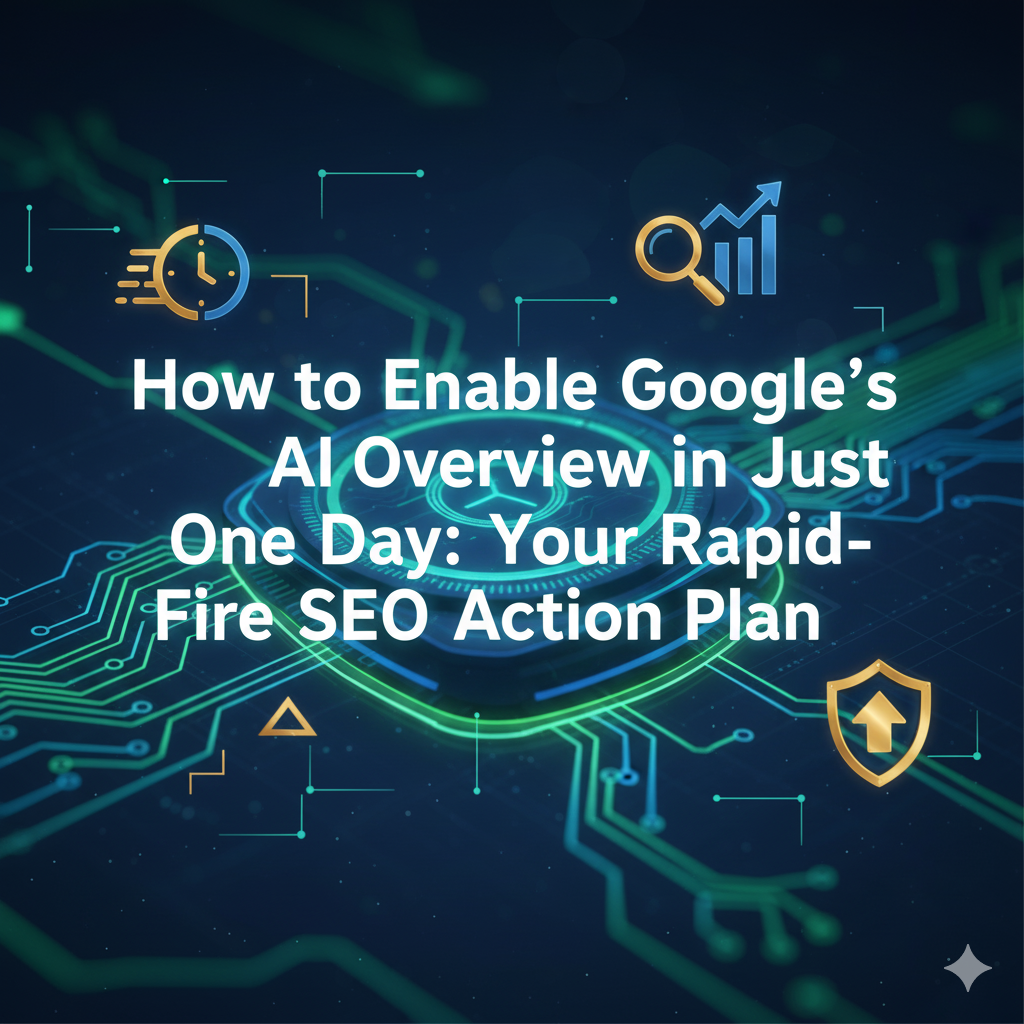Here we just update How enable google’s ai overview in just one day
1. Introduction: The Need for Speed (and Clarity)
- The Hook: Google’s AI Overviews (formerly SGE/AI Mode) are taking up prime real estate on the Search Engine Results Page (SERP). Getting cited means instant authority and visibility.
- The Challenge: You can’t just flip a switch. Google’s AI heavily prioritizes clarity, structure, and authority.
- The Promise (The “1-Day” Hack): While ranking takes time, you can implement the key structural and content changes today that make your existing content exponentially easier for the AI to “read” and cite. This is a content surgery, not a content marathon.
- Actionable Takeaway: Today, we focus on the structure and clarity of existing, high-potential content.
2. The Golden Rule: Answer First, Explain Second
- The Problem: Traditional blog posts often take a meandering path before delivering the main answer. AI Overviews need the answer immediately.
- The 1-Day Fix (The “Direct Answer” Block):
- Action: Go to your highest-ranking or most question-based posts.
- Tactic: Insert a concise, 1-3 sentence summary of the main answer right under the H1/title. Use bold text. This is the perfect snippet for the AI to pull.
- Example: If your post is “What are the best dog foods for sensitive stomachs?”, your first paragraph should be: “The best dog foods for a sensitive stomach are typically single-protein formulas with limited, highly digestible ingredients like hydrolyzed chicken or white rice.”
3. Supercharge Readability for AI Skimmability
- AI loves clear, segmented, and logical content. Make your post look like an easy-to-digest textbook.
- The 1-Day Fix (Formatting Overhaul):
- Headings: Ensure every section uses logical, hierarchical headings ($text{H}2 rightarrow text{H}3 rightarrow text{H}4$). Your $text{H}2$s should often be the questions people search.
- Lists: Convert dense paragraphs into bulleted or numbered lists. AI frequently uses lists in its summaries for step-by-step guides and feature comparisons.
- Short Paragraphs: Break up any paragraphs longer than 3-4 sentences. The AI struggles to parse key facts from long, dense text blocks.
4. Target Conversational, Question-Based Queries
- AI Overviews are frequently triggered by questions and conversational searches (e.g., “Tell me how to…”).
- The 1-Day Fix (Keyword & Question Injection):
- Action: Use Google’s “People Also Ask” (PAA) section and related searches to find common follow-up questions.
- Tactic: Dedicate an entire section to an FAQ (Frequently Asked Questions) at the end of your post. Format each question as an $text{H}2$ or $text{H}3$ followed by a direct, 1-2 sentence answer. This is gold for the AI.
5. Add Schema Markup (The AI’s Translator)
- Schema markup is code that tells search engines exactly what your content is about.
- The 1-Day Fix (Implement Structured Data):
- Action: Use a WordPress plugin (like Rank Math or Yoast SEO) or a free schema generator tool.
- Tactic: Focus on
HowToschema (for guides) andFAQschema (for the section you just created). This structured data is a direct instruction to the AI, saying: “Here is the key information you need to summarize this page.
6. Boost E-E-A-T (Experience, Expertise, Authoritativeness, Trustworthiness)
- Google’s AI is highly selective and wants to cite only the most credible sources.
- The 1-Day Fix (Trust Signals Check):
- Author Bio: Does the article have a clear author with a relevant credential/bio? Update it to state their expertise.
- Citations: Add external links to high-authority, trustworthy sources (like official studies, government sites, or well-known industry leaders) to back up your facts.
- Timestamps: Check that the post has a recent “Last Updated” date. Freshness is a key signal.
7. Monitor and Iterate (Beyond Day 1)
- You’ve done the work, now you need to see the results.
- The Action: Start tracking your target question-based keywords in a rank tracking tool that shows SERP features (like AI Overviews/SGE).
- The Iteration: If you still don’t appear after a few weeks, review the content cited in the AI Overview and ask: “How is their answer more direct, clearer, or more authoritative than mine?” Then, adjust your content.
Win the New Race for Visibility
- The age of AI Overviews is here, and the sites that adapt fastest will dominate the top of the SERP.
- By focusing on extreme clarity, strong structure, and machine-readable formatting, you can give your content the best possible chance to be featured in an AI Overview—and you can complete most of that work in a single, focused day.
- Call to Action: Share this post and tell us which of these 7 tips gave you the fastest boost in AI Overview visibility!

